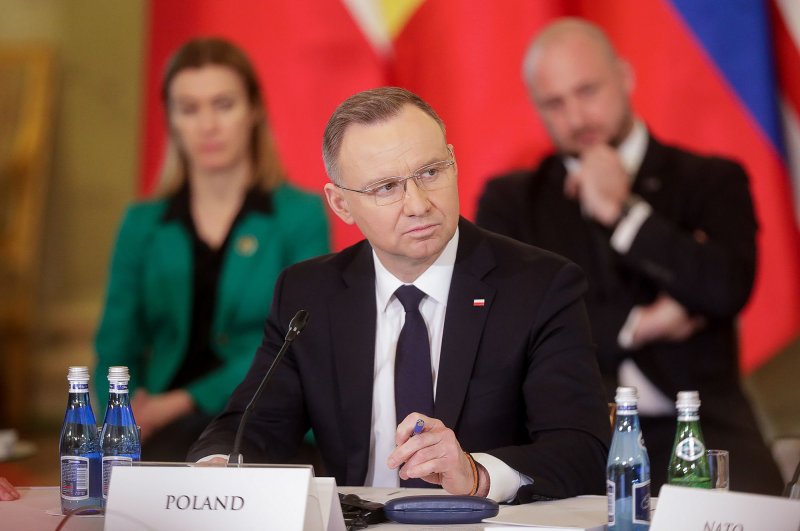The European Union has taken legal action against Poland after President Andrzej Duda signed a controversial law seeking to stem Russian influence in the country's politics. File Photo by Przemyslaw keler/KPRP/UPI |
License Photo
June 8 (UPI) -- The European Commission filed a lawsuit against Poland Thursday in an effort to overturn a law that is intended to counter Russian influence in the country but which critics argue would serve to silence political opponents.
The commission announced it opened an infringement procedure, notifying Poland the measure represents multiple violations of EU law including the principle of democracy, principles of legality and non-retroactivity of sanctions, rights of effective judicial protection, and requirements of law related to data protection.
"More concretely, the commission considers that the new law unduly interferes with the democratic process," it said. "The activities of the committee, e.g., investigations and public hearings, risking to create grave reputational damage for candidates in elections and, by finding that a person acted under Russian influence, could limit the effectiveness of the political rights of persons elected in democratic elections."
The commission said Poland has 21 days to respond to the letter.
Polish President Andrzej Duda signed the bill into law last week despite massive international opposition, although he called for an official legal examination of the measure to ensure its constitutionality.
Duda and the bill's supporters said it will help root out Russian sympathizers, but opponents -- including the United States, the European Commission and members of the European Parliament -- remain convinced the law will lead to harassment of opposition candidates.
Liberal members of Poland's national assembly vowed to boycott the law, which calls for the creation of a nine-member "Kremlin commission" that would be appointed by the Parliament, where populist national conservatives hold a slim majority.
To carry out its work, the panel would be given access to all government departments and documents, while also serving as a tribunal with the power to find offenders guilty of acting on behalf of the Kremlin.
Legal experts said this level of judicial power outside a courtroom goes too far by undermining the constitutional right to a fair trial.
The U.S. State Department issued a statement May 29 saying it was "concerned by the Polish government's passage of new legislation that could be misused to interfere with Poland's free and fair elections."
"We share the concerns expressed by many observers that this law to create a commission to investigate Russian influence could be used to block the candidacy of opposition politicians without due process," the statement by State Department spokesperson Matthew Miller said. "We call on the government of Poland to ensure this law does not preempt voters' ability to vote for candidate of their choice and that it not be invoked or abused in ways that could affect the perceived legitimacy of elections."
Another controversial aspect of the law gives the panel power to levy fines and penalties that may include a decade-long ban from public office, which minority lawmakers argue would be used to sink their leader, former Prime Minister Donald Tusk.
Last Friday, Duda vowed to seek amendments that would eliminate the sanctions provision and the 10-year ban from public office, but opponents argued these rollbacks were not enough to meet the legal threshold of the constitution.
Supporters of the law maintained that it would serve as a check on deals such as the restrictive energy policies that were adopted by Warsaw when Tusk was at the helm, before Russia annexed Crimea in 2014.
Deep divisions have emerged over the new law, which set the stage for a contentious election this fall as the ruling Law and Justice (PiS) party sought to extend its policy platform into a third term.
Half a million demonstrators flooded the streets of Warsaw Sunday to protest the law.
Szymon Szynkowski vel Sęk, who serves as Poland's Minister to the EU, expressed confidence that the law would be upheld in court.
"We will calmly pass on the legal and factual arguments in this case after reviewing the [Commission's] concerns," he said on Twitter.
Polish leaders have been increasingly at odds with the EU as the country has repeatedly violated the commission's rules and standards in the months before the anti-Russian legislation was passed in May.
Earlier this week, the Court of Justice of the European Union issued a ruling that judicial reforms passed recently by the Polish government had broken EU laws by threatening the sovereignty of judges.















